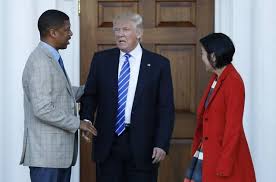https://www.theguardian.com/commentisfree/2016/nov/16/globalization-trump-inequality-thomas-piketty

- Rethink Globalization, Or Trumpism Prevails - Thomas Piketty (The Guardian)
- It was the Democrats' Embrace of Neoliberalism That Won It for Trump - Naomi Klein (The Guardian)
By Thomas Piketty
November 16, 2016
Let it be said at once: Trump's victory is primarily due to the explosion in economic and geographic inequality in the United States over several decades and the inability of successive governments to deal with this.
Both the Clinton and the Obama administrations frequently went along with the market liberalization launched under Reagan and both Bush presidencies. At times they even outdid them: the financial and commercial deregulation carried out under Clinton is an example. What sealed the deal, though, was the suspicion that the Democrats were too close to Wall Street - and the inability of the Democratic media elite to learn the lessons from the Sanders vote.
Hillary won the popular vote by a whisker (60.1 million votes as against 59.8 million for Trump, out of a total adult population of 240 million), but the participation of the youngest and the lowest income groups was much too low to enable key states to be won.
The tragedy is that Trump's program will only strengthen the trend towards inequality. He intends to abolish the health insurance laboriously granted to low-paid workers under Obama and to set the country on a headlong course into fiscal dumping, with a reduction from 35% to 15% in the rate of federal tax on corporation profits, whereas to date the United States had resisted this trend, already witnessed in Europe.
In addition, the increasing role of ethnicity in American politics does not bode well for the future if new compromises are not found. In the United States, 60% of the white majority votes for one party while over 70% of the minorities vote for the other. In addition to this, the majority is on the verge of losing its numerical advantage (70% of the votes cast in 2016, as compared with 80% in 2000 and 50% forecast in 2040).
The main lesson for Europe and the world is clear: as a matter of urgency, globalization must be fundamentally re-oriented. The main challenges of our times are the rise in inequality and global warming. We must therefore implement international treaties enabling us to respond to these challenges and to promote a model for fair and sustainable development.
Agreements of a new type can, if necessary, include measures aimed at facilitating these exchanges. But the question of liberalizing trade should no longer be the main focus. Trade must once again become a means in the service of higher ends. It never should have become anything other than that.
There should be no more signing of international agreements that reduce customs duties and other commercial barriers without including quantified and binding measures to combat fiscal and climate dumping in those same treaties. For example, there could be common minimum rates of corporation tax and targets for carbon emissions which can be verified and sanctioned. It is no longer possible to negotiate trade treaties for free trade with nothing in exchange.
From this point of view, Ceta, the EU-Canada free trade deal, should be rejected. It is a treaty which belongs to another age. This strictly commercial treaty contains absolutely no restrictive measures concerning fiscal or climate issues. It does, however, contain a considerable reference to the "protection of investors". This enables multinationals to sue states under private arbitration courts, bypassing the public tribunals available to one and all.
The legal supervision proposed is clearly inadequate, in particular concerning the key question of the remuneration of the arbitrators-cum-referees and will lead to all sorts of abuses. At the very time when American legal imperialism is gaining in strength and imposing its rules and its dues on our companies, this decline in public justice is an aberration. The priority, on the contrary, should be the construction of strong public authorities, with the creation of a prosecutor, including a European state prosecutor, capable of enforcing their decisions.
The Paris Accords had a purely theoretical aim of limiting global warming to 1.5 degrees. This would, for example, require the oil found in the tar sands in Alberta to be left in the ground. But Canada has just started mining there again. So what sense is there in signing this agreement and then, only a few months later, signing a highly restrictive commercial treaty without a single mention of this question?
A balanced treaty between Canada and Europe, aimed at promoting a partnership for fair and sustainable development, should begin by specifying the emission targets of each signatory and the practical commitments to achieve these.
In matters of fiscal dumping and minimum rates of taxation on corporation profits, this would obviously mean a complete paradigm change for Europe, which was constructed as a free trade area with no common fiscal policy. This change is essential. What sense is there in agreeing on a common fiscal policy (which is the one area in which Europe has achieved some progress for the moment) if each country can then fix a near-zero rate and attract all the major company headquarters?
It is time to change the political discourse on globalization: trade is a good thing, but fair and sustainable development also demands public services, infrastructure, health and education systems. In turn, these themselves demand fair taxation systems. If we fail to deliver these, Trumpism will prevail.
[Thomas Piketty is professor of economics at the Paris School of Economics. He is the author of numerous articles and books, including Capital in the Twenty-First Century.]
This piece was first published in Le Monde on 12 November 2016




